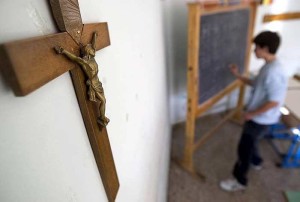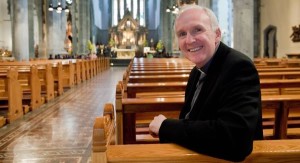
By Susan Gately - 20 July, 2018
 The Bishop of Limerick, Brendan Leahy, has clarified the Church’s position in relation to the question of students who opt out of religious instruction/education in State schools.
The Bishop of Limerick, Brendan Leahy, has clarified the Church’s position in relation to the question of students who opt out of religious instruction/education in State schools.
Earlier this week, the Irish Times broke the story that the Catholic bishops had called on the Minister for Education to withdraw a directive allowing students who opt out of religious instruction in State-run secondary schools to be timetabled for other subjects.
The letter, obtained through the Freedom of Information Act by the Irish Times, was signed by Bishop Brendan Leahy, chair of the Irish Episcopal Commission, and Bishop Brendan Kelly, chair of the group’s Council for Education.
It warned that ‘opt out’ students who receive tuition in an exam subject instead of religion will receive an unfair advantage. Instead, the bishops proposed that students who opt out of religion should be offered a course in “religious heritage and values as well as ethics”.
According to the correspondence, the bishops also expressed their surprise that the circular had been issued without consultation or notification. “While we are respectful of the wishes of those who opt out of religious education … we are equally clear that those who continue to take religious education should not be disadvantaged”.
The letter stated: “It is crucial that students are exposed to the religious interpretation of life. Such education is essential in respect of understanding our cultural heritage and in terms of harmony and understanding what is becoming a multicultural society.”
Currently in secondary schools run by Education and Training Boards (ETBs), students who do not wish to participate in religious instruction are left to study at the back of the classroom or in a study hall. However, earlier this year the Minister for Education issued a circular calling for such students to be timetabled for alternative tuition.
Speaking to CatholicIreland, Bishop Brendan Leahy said the real issue “was not that we bishops wanted something done in all state schools. We were referring to those schools where we have what are called model agreements”.

Bishop Brendan Leahy
Typically, these are schools which came to life from a joint collaboration between a diocese/religious order and Education and Training Boards (ETBs). There are around 300 ETB schools.
“In the model agreements,” the Bishop of Limerick explained, “we are involved in the management of the school, so naturally religious education is of concern to us. The Minister issued a circular on that topic without consulting us, whereas the agreement says there should be consultation. Our concern is that in schools we are involved in, if religious education is not taken as a subject, we would want the issue of ethics, heritage and so on, to be considered.”
According to the Irish Times, Minister Bruton’s letter in reply to the bishops said the purpose of the circular was to “change the practice by which opt-outs are made … It is not intended to alter the deeds of trust or the model agreements and that is stated expressly in the circular.” The Minister said his officials were available to tease out in detail any particular concerns the bishops might have.